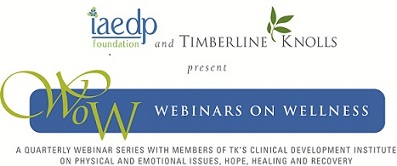Wednesday, August 31, 2011
New students feeling increased pressure to stay thin in college
By Jordan Hearne, Reporter
Source for article: Baylorlariat.com
A common belief is that when students start college, they gain weight from the university lifestyle. In truth, this idea might actually be contributing to eating disorders across campus.
“Freshman 15 is a complete myth,” Dr. Emma Wood, staff psychologist in the Baylor Counseling Center, said. Wood, who specializes in body image problems and eating disorders, is ready to put an end to the rumor that freshman gain 15 pounds within their first year of college. Typically, students don’t gain weight at all their freshman year, and if they do, it is on average only seven pounds, she said.
...Continue reading article here.
**********************************************
With a new school year under way, college students face increasing pressures, which can often influence them to engage in disordered eating behaviors. What resources should be made available on college campuses to aid students who may be struggling?
Source for article: Baylorlariat.com
A common belief is that when students start college, they gain weight from the university lifestyle. In truth, this idea might actually be contributing to eating disorders across campus.
“Freshman 15 is a complete myth,” Dr. Emma Wood, staff psychologist in the Baylor Counseling Center, said. Wood, who specializes in body image problems and eating disorders, is ready to put an end to the rumor that freshman gain 15 pounds within their first year of college. Typically, students don’t gain weight at all their freshman year, and if they do, it is on average only seven pounds, she said.
...Continue reading article here.
**********************************************
With a new school year under way, college students face increasing pressures, which can often influence them to engage in disordered eating behaviors. What resources should be made available on college campuses to aid students who may be struggling?
Three Book Drawings Offered Now!
Win One of 10 Free Books Offered in Drawing
DRAWING ENDS September 15, 2011.
Please complete the contact form, enter "Total Temple Makeover" in message, and you will automatically be entered into our September 15, 2011 drawing!
The Total Temple Makeover
By Dr. Gregory Jantz with Ann McMurrayWhile the world reels with an ever-growing array of lose-weight-quick schemes, Dr. Gregory Jantz applies common sense and spiritual encouragement to lead readers on a reasonable, realistic path to healthier living.
Unlike the radical and even dangerous tactics that often captivate those who hunger for dramatic change, Jantz advocates a gentle twelve-week program, which considers the whole person, not just body weight.
This comprehensive approach incorporates scripture study, prayer, and journaling, as well as nutrition, food-consumption plans, and body maintenance with the intention of reshaping a person's self-image in addition to dropping inches in the waistline.
Purchase @ A Place of Hope Bookstore
Dr. Jantz has generously donated 10 books to be given away in this drawing!
Win One of 5 Free Books Offered in Drawing
DRAWING ENDS October 1, 2011.
Please complete the contact form, enter "Goodbye Ed, Hello Me" in message with your name, email and address, and you will automatically be entered into our October 1, 2011 drawing!
Please complete the contact form, enter "Goodbye Ed, Hello Me" in message with your name, email and address, and you will automatically be entered into our October 1, 2011 drawing!
Goodbye Ed, Hello Me: Recover from Your Eating Disorder and Fall in Love with Life
(McGraw-Hill) by Jenni Schaefer
Don't Battle an Eating Disorder Forever-Recover from It Completely
Jenni Schaefer and Ed (eating disorder) are no longer on speaking terms, not even in her most difficult moments. In her bestseller, Life Without Ed, Jenni learned to treat her eating disorder as a relationship, not a condition - enabling her to break up with Ed.
In Goodbye Ed, Hello Me Jenni shows you that being fully recovered is not just about breaking free from destructive behaviors with food and having a healthy relationship with your body; it also means ?nding joy and peace in your life.
Combining Jenni's signature personal advice and unfailing encouragement along with valuable exercises you can do as you read, Goodbye Ed, Hello Me will give you the prescriptive tools to take the ?nal steps in divorcing your Ed completely.
Lynn Grefe, CEO of the National Eating Disorders Association, says, "Jenni may someday be named the trend-setter for the miraculous word "recovered.'"
These books were generously donated by Center for Change and Jenni Schaefer.
Win One of 5 Free Books Offered in Drawing
DRAWING ENDS October 1, 2011.
Please complete the contact form, enter "Goodbye Ed, Hello Me" in message with your name, email and address, and you will automatically be entered into our October 1, 2011 drawing!
Please complete the contact form, enter "Goodbye Ed, Hello Me" in message with your name, email and address, and you will automatically be entered into our October 1, 2011 drawing!
Life Without Ed: How One Woman Declared Independence from Her Eating Disorder and How You Can Too
Jenni had been in an abusive relationship with Ed for far too long. Ed's name comes from the initials E.D. - as in eating disorder. He controlled Jenni's life, distorted her self-image, and tried to physically harm her throughout their long affair. Then Jenni met psychotherapist and author Thom Rutledge. He taught her how to treat her eating disorder as a relationship, not a condition. By thinking of her eating disorder as a unique personality separate from her own, Jenni was able to break up with Ed once and for all.
Inspiring, compassionate, and filled with practical exercises to help you break up with your own personal E.D., Life Without Ed provides new hope for the disorders that plague millions of women and young girls. Beginning with Jenni's "divorce" from Ed, this supportive, lifesaving book combines a patient's insights and experiences with a therapist's prescriptions for success to help you live a healthier, happier life without Ed.
These books were generously donated by Center for Change and Jenni Schaefer.
Orthorexia Nervosa: Healthy Eating Gone Awry - Free Webinar September 21st, 2011

Presented by Juliet Zuercher, RD, Nutrition Coordinator of Timberline Knolls Residential Treatment Center
Date: Wednesday, September 21, 2011
Time: 1:00 p.m. to 2:00 p.m. CDT (2:00 p.m. EDT / 11:00 a.m. PDT)
Location: Online webinar. All registrants will receive an email with the URL and instructions on how to join the webinar.
Cost: Free
CE applied for social workers, counselors and psychologists
Eating a healthy diet today can be challenging for many people, given the fast food choices available in our country and often contradictory information online and in the media. Certain individuals, in pursuit of health, can become lost in the maze of nutrition information and inadvertently turn healthy nutrition into a harmful obsession. Those who develop a pathological obsession with healthy eating are described as having “orthorexia nervosa.” This presentation will describe the etiology of orthorexia as well as common causes. Various treatment approaches will be discussed including common pitfalls that professionals can experience when working with this population.
Click Here to Register

About Juliet Zuercher, RD
At Timberline Knolls, Juliet Zuercher is a member of the leadership team and directs nutrition therapy in conjunction with the center’s medical director as part of individualized and comprehensive therapy for every patient. She works to advance high standards for nutrition literacy to ensure residents continue to receive the best possible care. With a primary approach that addresses the thoughts and feelings connected to one’s relationship with food and body, Juliet challenges the distorted myths about food, teaching the science behind how the body works, and ways food can nourish both mind and body. This is integral to helping residents redevelop and tap into their internal wisdom and to get reconnected to their body’s wisdom through the process of recovery.
Juliet is a graduate of Ohio State University with more than 15 years of experience in directing nutrition counseling and services and reaching out to the greater community as a speaker and nutrition resource. She has traveled extensively across North America presenting workshops to help educate professionals about treating eating disorders. Juliet also is actively involved with the Academy for Eating Disorders (AED) and is a member of the International Association of Eating Disorder Professionals (iaedp).
About Timberline Knolls
Timberline Knolls Residential Treatment Center is located on 43 beautiful acres just outside Chicago, offering a nurturing environment of recovery for women ages 12 and older struggling to overcome eating disorders, substance abuse, mood disorders, trauma and co-occurring disorders. By serving with uncompromising care, relentless compassion and an unconditional joyful spirit, we help our residents help themselves in their recovery.
Tuesday, August 30, 2011
Eating Disorder Recovery Tools
These tools are helpful in addition to seeking professional eating disorder treatment. Personal commitment to growth, excellent professional help and recovery tools all make recovery possible. Anorexia, bulimia, binge eating disorder and compulsive overeating are destructive attempts to cope with life's challenges. Here are tools that may help you in your recovery work.
Virtual Library
Artistic Expression and ED
View and read about the healing benefits of artistic expression and eating disorders. Paintings, drawings, dance, music, writing and more.
Body Image
Body image is our perception of body, not only its appearance, but its functionality, health and purpose. A positive body image is essential to well being and recovery from anorexia, bulimia, and binge eating disorder.
Eating Disorder Hope Club
Eating Disorder Hope and MentorCONNECT have collaborated to offer this unique opportunity for eating disorder sufferers to find free support and encouragement from others who are in recovery.
Feelings
Feelings matter. Our emotions give us valuable information about ourselves and our perceptions of the environment. Developing awareness of feelings and developing skills to tolerate uncomfortable feelings often go hand in hand with eating disorder recovery.
Health
Health and medical consequences vary depending on many factors involved with eating disorders. Medical complications such as bone loss, amenorrhea and heart damage are often associated with eating disorders.
Mindfulness
Mindfulness is the practice of becoming more aware of the present moment, rather than dwelling in the past or projecting into the future. Many find mindfulness techniques helpful in eating disorder recovery.
Mindset
Our inner dialogue with ourselves is critical to our recovery and general well being. Learn how to recognize ineffective thoughts and replace these with accurate and uplifting thoughts.
Nutrition
Nutrition is the fuel for our body. Eating disorders often alter what was once a natural and enjoyable relationship with food and our bodies. Learn more about nutrition, intuitive eating and eating disorder recovery here.
Relapse
Learn to recognize the early warning signs of relapse and develop skills and resources to prevent and/or pull oneself out of relapse.
Self Help
There are many supportive books, articles, groups and organizations to supplement your treatment by eating disorder professionals. Here are some resources.
Virtual Library
Webinars, MP3 downloads, videos and more covering important recovery topics such as body image, binge eating disorder, families of eating disorder sufferers, pregnancy, nutrition and more.
Monday, August 29, 2011
Eating Disorder Hope proudly announces the addition of Eating Disorders Program at Sierra Tucson to the comprehensive Eating Disorder Specialist Library
Eating Disorders Program at Sierra Tucson
There is a place where pain is met with compassion, fear is met with reassurance, and anger is met with understanding...

Located in the foothills of the Santa Catalina Mountains near Tucson, Arizona, Sierra Tucson provides a natural healing environment with the highest level of confidentiality. A member of CRC Health Group, Sierra Tucson is multi-licensed as a psychiatric hospital and residential behavioral health treatment center and has received dual Accreditation by The Joint Commission.
Individualized Treatment

The Eating Disorders Program at Sierra Tucson comprehensively treats eating disorders for males or females who suffer from Anorexia, Bulimia, and Binge Eating Disorder/Compulsive Overeating. Sierra Tucson's professional, caring staff understand the patients' deep emotional pain. Individualized treatment plans help uncover and heal underlying issues so that patients can discover the rewards of health and recovery. The majority of patients in the Eating Disorders Program have dual diagnoses that are treated along with their eating disorder. These may include depression, anxiety, alcohol dependency, and drug abuse or dependency. Our program provides a safe environment and an integrative approach that treats body, mind, and spirit in the context of healthy families.
Exercise Philosophy

The program helps each patient develop a healthy relationship with exercise that is nourishing to the body. Patients work both individually and in group settings with a fitness specialist to develop a program that will meet their fitness goals within appropriate exercise boundaries. This personal approach leads patients through their fears, misconceptions, and unhealthy behaviors toward exercise.
Sierra Tucson's facility includes a walking trail; swimming pool; and basketball, pickleball, and volleyball courts. A modern gym contains treadmills, stationary bicycles, stairmasters, elliptical machines, weight machines, and free weights.
Nutrition Philosophy

The menu at Sierra Tucson strives to incorporate the latest medical and nutritional recommendations for our eating disorder population. The meals include foods that are high in complex carbohydrates, low in fat, low in sodium, and moderate in protein. Patients are encouraged to learn to enjoy the natural flavor of nutritiously prepared foods without adding artificial flavorings and sweeteners.
Program Highlights
Sierra Tucson's bio-psycho-social-spiritual approach provides a full range of options to meet each individual's specific needs. The following services are available to eating disorder patients:- Weekly body image workshop
- Education about the medical consequences of eating disorders
- Weekly skills group focusing on development of emotional regulation and distress tolerance
- Individual consultations with registered dietitian
- Individualized food plan with meal support
- Weekly nutrition groups to address food-related issues
- Individual fitness consultation and prescription for exercise
- Therapeutic & Recreational Activities may include Equine-Assisted Therapy, Adventure Therapy, and Creative Expression
- Individual and group sessions to address coexisting disorders such as chemical dependency, compulsive behaviors, mood disorders, trauma/abuse, or grief/loss issues
- Food preparation demonstration by head chef
- Restaurant outings
- Twelve-Step meetings held on campus
- Eye Movement Desensitization and Reprocessing (EMDR) available for treatment of trauma
- Somatic Experiencing® available for treatment of trauma
- Integrative Therapies may include Acupuncture, Chiropractic, Swedish and Shiatsu Massage Therapy, Qi Gong, Reiki, Yoga, and Zero Balancing
- Family Program
Program Goal

The overall goal of the Eating Disorders Program at Sierra Tucson is to facilitate the patient's first steps on the long road to recovery, restoring each person to wholeness and good health of body, mind, and spirit.
Location / Contact
Sierra Tucson
39580 S. Lago del Oro Parkway
Tucson, Arizona 85739 (USA)
39580 S. Lago del Oro Parkway
Tucson, Arizona 85739 (USA)
Intake Department: (800) 842-4487
Other Departments: 800-624-9001
Freephone from U.K: 0800 891166
email: Outreach@SierraTucson.com
Other Departments: 800-624-9001
Freephone from U.K: 0800 891166
email: Outreach@SierraTucson.com
For more information, please call us anytime at
(800) 842-4487 or contact us by email to request more information.
Learn more about The Eating Disorders Program at Sierra Tucson(800) 842-4487 or contact us by email to request more information.
***********************
The Eating Disorder Hope Specialist Library features detailed overviews and pictures of eating disorder treatment centers. Visit the Eating Disorder Specialist Library today and simplify your search for specialized treatment!
Many eating disorder sufferers and families find that reviewing the online 'virtual brochures' offered in the Eating Disorder Specialist Library greatly simplifies their search for treatment.
The Eating Disorder Specialist Library puts you in touch with some of the best treatment centers and providers for those suffering from anorexia, bulimia or binge eating disorder and/or co-occurring issues like addiction, anxiety and depression.
Treatment Centers and Providers interested in participating in the Eating Disorder Specialist Library can email: info@eatingdisorderhope.com for further information.
***********************
Ruling may broaden insurance plans' coverage for mental illness
By Carol J. Williams, Los Angeles Times
Source: www.Latimes.com
A Northern California woman's treatment for anorexia at a residential facility was medically necessary and must be covered by her healthcare plan, a federal appeals court has ruled in a case that could lead to more extensive benefits for those being treated for mental illnesses.
...Continue reading article here.
*******************************************************
How would greater coverage from insurance companies for mental health illness increase the likelihood of recovery from eating disorders?
Source: www.Latimes.com
A Northern California woman's treatment for anorexia at a residential facility was medically necessary and must be covered by her healthcare plan, a federal appeals court has ruled in a case that could lead to more extensive benefits for those being treated for mental illnesses.
...Continue reading article here.
*******************************************************
How would greater coverage from insurance companies for mental health illness increase the likelihood of recovery from eating disorders?
The Power of Expressive Arts -- Drama Therapy
Tweet
NORMAL is a nonprofit organization that educates about the therapeutic impact of the arts in the learning and healing processes. For the five years we have been educating in schools with award-winning arts programs, we have seen the positive impact the arts have in both the educational and medical environments. As a master's level trained performer, I have also seen the benefits of arts-based initiatives in an array of personal, educational and medical settings, as well. In a May 2011 report issued by The President's Committee on the Arts and the Humanities (PCAH) entitled, Reinvesting in Arts Education: Winning America's Future Through Creative Schools, reveal that "the process of making art -- whether it is written performed, sculpted, photographed, filmed, danced, or painted -- prepares children for success in the workforce not simply as artists, but all professions."*
This series educates about the array of expressive arts that are useful, specifically, in the healing process from eating disorders and other addiction programs. According to the International Expressive Arts Therapy Association, expressive arts combine the visual arts, movement, drama, music and writing to foster deep personal growth and community development.*
The focus of this post is drama therapy...finish readingFriday, August 26, 2011
LICADD Introduces Eating Disorder Support Group
Source: LongIslandPress.com
Nearly half of all Americans know someone struggling with an eating disorder. Eating disorders are life-threatening and affect 8 million Americans. Men and women with eating disorders rarely seek help and 20% of people suffering from anorexia die from related complications, including suicide and heart problems. In effort to address this issue, the Long Island Council on Alcoholism and Drug Dependence, Inc. (LICADD) is extending its services to reach those suffering from the illness by offering an ongoing Eating Disorder Support Group this fall.
...Continue reading here.
********************************************************
Support groups are a valuable part of recovery from an eating disorder. If you or someone you know is currently in recovery, what resources have been a helpful part of your journey?
Nearly half of all Americans know someone struggling with an eating disorder. Eating disorders are life-threatening and affect 8 million Americans. Men and women with eating disorders rarely seek help and 20% of people suffering from anorexia die from related complications, including suicide and heart problems. In effort to address this issue, the Long Island Council on Alcoholism and Drug Dependence, Inc. (LICADD) is extending its services to reach those suffering from the illness by offering an ongoing Eating Disorder Support Group this fall.
...Continue reading here.
********************************************************
Support groups are a valuable part of recovery from an eating disorder. If you or someone you know is currently in recovery, what resources have been a helpful part of your journey?
Thursday, August 25, 2011
Timberline Knolls Celebrates National Recovery Month
Free Webinar on September 1 Offers Advice and Tips for Lifelong Recovery

CHICAGO, Aug. 24, 2011 /PRNewswire/ -- To celebrate National Recovery Month in September, Timberline Knolls Residential Treatment Center is hosting a free Webinar titled "Recovery: Breaking Through the Isolation of Addiction", 7 - 8 p.m. CDT on September 1, 2011.
"Addiction is a treatable illness and individuals can fully recover from it one day at a time for the rest of their lives," said Dr. Kim Dennis, host of the Webinar and medical director at Timberline Knolls. "People in recovery need help on a daily basis. As humans, we need to be connected to others in order to live a full life that's free from the physical, social, emotional and spiritual death that results from addiction."
The Webinar, hosted in conjunction with dailystrength.org, will give attendees advice on increasing chances for lifelong recovery. Many individuals with co-occurring disorders will use their addictions to cope with or medicate their depression, eating disorder, bipolar disorder, or trauma. If the co-occurring disorders are not identified and treated, the chances of long-term recovery diminishes dramatically.
"The identification and treatment of co-occurring disorders is critical for recovery," adds Dr. Dennis. "Going to 12-step meetings, getting a sponsor and working the steps are also equally important components to recovery."
Addiction is a progressive, chronic and potentially fatal disease. Recovery entails coming out of the isolation which characterizes addiction. Isolation can weaken our spiritual, emotional and social selves. The Webinar is in line with the Substance Abuse and Mental Health Administration's (SAMHSA) message that recovery is possible and tangible steps can be taken to lead a new and abundant life.
For more information or to RSVP for the Webinar, please go to http://www.timberlineknolls.
About Timberline Knolls Residential Treatment Center:
Timberline Knolls is a leading private residential treatment center for eating disorders and substance abuse, with or without trauma, a dual diagnosis or co-occurring disorder. Expert treatment staff offers a nurturing environment of recovery for women and girls (ages 12 - 65+) on a wooded 43-acre campus in suburban Chicago. Women and families seeking Christian treatment have the option of working with a dedicated Christian therapist. For more information on Timberline Knolls Residential Treatment Center, call us at 877.257.9611.
About DailyStrength:
DailyStrength is one of the largest online health support group communities on the Internet, with over 500 support groups in areas like depression, PTSD, addiction, loneliness, relationships, bereavement, and more. Share and learn from the experience of other members who are going through the same challenges, and talk to people who understand what it's like. Active discussion boards, journaling, photo sharing, private messaging, and supportive online Hugs are just a few of the features you'll find at DailyStrength. Membership is free, and your privacy is protected-join today.
Contact:
Mary Anne Morrow
mmorrow@timberlineknolls.com
Tel: 602-359-6989
Mary Anne Morrow
mmorrow@timberlineknolls.com
Tel: 602-359-6989
Wednesday, August 24, 2011
Thursday, September 15th Workshop in New York - Dual-Occurences: Coping Strategies for Eating Disorders
Dual-Occurrences: Coping Strategies for Eating Disorders
It is not uncommon for individuals with eating disorders to grapple with co-occurring psychological disorders. This workshop will offer effective coping strategies for those in recovery from an eating disorder and a co-occurring disorder such as substance abuse, PTSD, depression, and anxiety.
Thursday, September 15, 2011, 7- 8:30pm
19 West 34th Street - 12th Floor – Room 1207, New York
Space is limited and pre-registration is required. Register online at www.roaed.org or call 212. 935.2015. Suggested donation - $10.00
About Stanley Selinger, PhD

After working at Timberline Knolls for nearly five years, Dr. Selinger became the Family Therapy Coordinator in November 2010. He conducts family assessments and provides family counseling. Additionally, Dr. Selinger co-developed and co-facilitates the Multi-Family Group program, which is designed to educate families and provide a forum where they can learn from one another. He also oversees the Family Dynamics Group where residents gain insight into family structure, methods of communication, conflict resolution, healthy and unhealthy roles, etc.
Dr. Selinger has presented at many professional conferences around the country and has been published repeatedly in professional journals. He is currently an adjunct faculty member at Governors State University in Illinois as well as a clinical assistant professor of psychology in the College of Medicine at University of Illinois at Chicago. He is a member of the American Psychological Association and the Illinois Psychological Association.
Timberline Knolls Residential Treatment Center is located on 43 beautiful acres just outside Chicago, offering a nurturing environment of recovery for women ages 12 and older struggling to overcome eating disorders, substance abuse, mood disorders, trauma and co-occurring disorders. For more information, visit www.timberlineknolls.com or call 877.257.9611.
**********************
Subscribe to:
Comments (Atom)







